I have some suggestions and thoughts, based on my own reading and thinking and praying and personal experience. Take them for whatever you think they’re worth.
So you understand where I’m coming from: 1 I have degrees in science (meteorology) and in theology and have been shaped by both disciplines. 2 I have much respect for our hierarchs. They are good responsible men. 3 For almost sixty years, first as an Anglican and now as an Orthodox, the Liturgy has been the center of my life. However, I am old and have an underlying health condition and so have been to Liturgy only 1 1/2 times since February. I’m not handling this very well. 4 I have been a pastor (now “emeritus” – sounds like an honor but it just means “retired”) for fifty five years and thus have a built-in concern for people, including you, which is why I’m writing this.
Not going to church
These past months have been extremely difficult for us Orthodox. For some Christians hearing a sermon Live Stream is sufficient. But we Orthodox need to be together. Our theology and our whole mentality require it: The Church is the Body of Christ. We meet Jesus Christ in each other. The Holy Eucharist is the Body of Christ. We meet Jesus Christ in the Divine Liturgy.
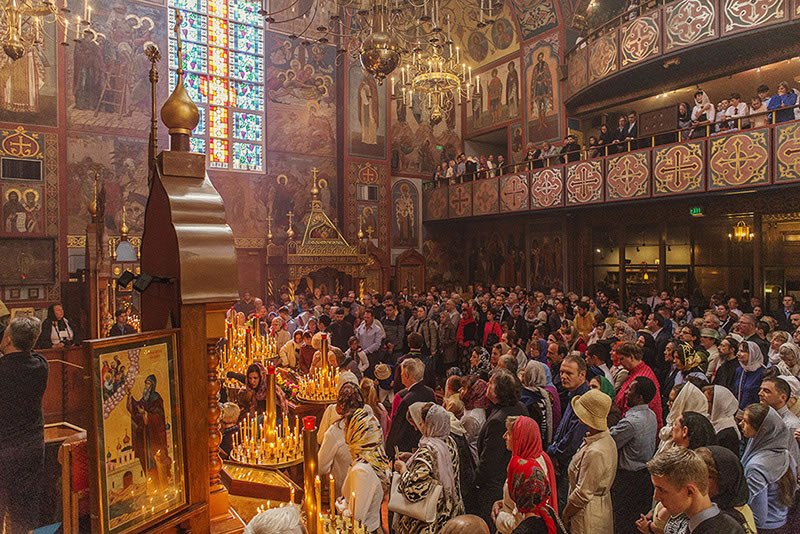
To be denied these things has undercut our Orthodox Life. Watching and worshiping by Live Stream has been a huge blessing. Phoning and texting and e-mailing each other have helped keep us close. (Thank God for modern technology. Most of the time.) But it’s obviously not the same. We need to be worshiping together and tasting the Holy Gifts together. We need to be talking with each other and eating and drinking together and hugging each other. We are not meant to be apart.
Reopening
Now, thank God, with the blessing of our hierarchs and the permission of our civil authorities, we’re beginning to open up our churches again to a limited extent – but hesitantly and with trepidation. Much about the Coronavirus is still not well understood, and most people have not been tested. The number of Covid-19 cases is increasing again in the US, rapidly in some places. Despite assurances from here and there to the contrary, the Pandemic is apparently far from over.
We must be cautious as we open up. We have few enough Orthodox on this continent. We don’t need any fewer.
So how can we know how to do this responsibly? both for our own safety and that of others. We need trustworthy advice. As with everything else, we can find a multitude of opinions and guesses online. I’ve settled on the most authoritative sources I know, the Center for Disease Control, the World Health Organization, and the Mayo Clinic. (Are they perfect? No. They also have struggled trying to get a handle on this bizarre Virus.)
They say the primary way the Virus spreads is through the air. The CDC says: “It is critical to emphasize that maintaining 6-feet social distancing remains important to slowing the spread of the virus.” Also, after some hesitation, all three of the above sources now agree that we should wear “simple cloth face coverings to slow the spread of the virus and help people who may have the virus and do not know it from transmitting it to others.” The CDC continues: “We now know from recent studies that a significant portion of individuals with coronavirus lack symptoms (‘asymptomatic’) and that even those who eventually develop symptoms (‘pre-symptomatic’) can transmit the virus to others before showing symptoms.”
To sum up their advice: Keep distance. Wear a mask. Be cautious, even of those who have no symptoms.
Directions from our Bishops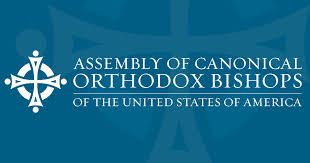
Out of their love and concern for us, the Assembly of Canonical Orthodox Bishops of the United States of America have been giving guidelines about how to re-open our churches – based largely on the information from the sources above. You can access the latest from the Assembly here: http://www.assemblyofbishops.org/news/2020/covid-19-reopening-service-guideline
In addition, most of our jurisdictional Metropolitans, Archbishops and Bishops have given specific directives, which they intend us to follow.
Going back to church
Here is our dilemma: Being away from church harms us spiritually. But from the time of the martyrs, the Church has taught that we should not intentionally put ourselves in harm’s way.
How to resolve the dilemma?
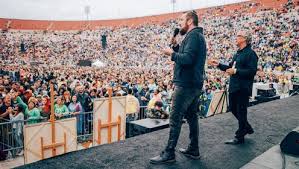 Here’s how not to do it: Some Evangelical pastors say “What? You don’t have faith? Just come to church! Don’t wear a mask. Ignore distancing. Don’t worry about it. God will protect you.” Please do not do that. This is blind unthinking “faith”. It has been shown to be a very effective way to spread the Coronavirus.
Here’s how not to do it: Some Evangelical pastors say “What? You don’t have faith? Just come to church! Don’t wear a mask. Ignore distancing. Don’t worry about it. God will protect you.” Please do not do that. This is blind unthinking “faith”. It has been shown to be a very effective way to spread the Coronavirus.
Here’s how true Faith works. I’ll quote the nurse in my doctor’s office last Wednesday. She began: “I have faith in God. I believe God has given us brains and common sense.” Yes! We should try to resolve this dilemma just as we do almost every other matter in life: Think it through as best we can, then trust God to take it and run. So…
Let’s Think
First, read our bishops’ directions, and you’ll see that they have thought things through very carefully. We do well to follow them.
As we consider returning to church, here are three more things to think about:
1 Obedience. Is your church carefully following your bishops’ directives and guidelines? Is your priest modeling the bishop’s instructions? Is your parish adhering strictly to the directives about how many people may be in church now? – ten, or 25% of normal attendance or whatever. Are people having their temperature taken before entering the church? Are those who have symptoms of disease being turned away? Is the temple being properly ventilated and sanitized? is hand sanitizer easily available? Have books been removed from the pews? Are icons being venerated without physical contact? Are people, including clergy, chanters and altar servers, keeping proper distance? Is the Antidoron being distributed in a safe manner? These are the things that make it safe for us to return. We’ll talk about receiving the Holy Eucharist in a moment.
2 Distancing. Our bishops direct that choir members keep more than six feet away from each other. This is because singing projects droplets from the throat farther than six feet. (This was part of CDC guidance till a few weeks ago, when it suddenly was withdrawn without explanation.) This directive seems to assume that the choir will do all the singing – as is still true in many Orthodox churches. But how should this apply to churches where the people also sing? In order for people to be safe, should everyone in “singing congregations” keep farther than six feet away from each other?
3 Masks, that “polarizing” subject, as our Antiochian Metropolitan Joseph calls it. He’s right, although I think this is quickly and for the most part becoming less divisive. But why ever should this have been polarizing?
Think, people. Think. Does wearing a mask deprive us of our God-given freedom? Yes, of course it does. And so does stopping for a red light, and driving on the right side of the road, and not yelling “fire” in a movie theater, and a multitude of other things that, without complaint, we do or refrain from doing for the good of others. Why all this commotion about sometimes wearing a mask? such a small thing!
Nor is this a political issue, one way or the other. (If it were, I wouldn’t be getting into it here.) As my fifteen year old grandson Rhys wrote to me the other day, using gentle sarcasm: “Viruses have political opinions of course. Everyone knows that.” No. This is a scientific, medical matter, pure and simple.
The scientific evidence is now clear: Masks protect the wearer somewhat, but they give a lot of protection to those around the wearer. This why many places now require masks: all doctors’ offices and hospitals, many churches and stores, Whole Foods and Costco, most airlines, Amtrak, as of today most of the state of Texas, the Anastasis (Church of the Holy Resurrection) in Jerusalem. Below: Pascha 2020 Procession of the Holy Fire in Jerusalem Even our plumber wears a mask. Because of this scientific evidence, our Antiochian Metropolitan now directs his clergy “to encourage as strongly as possible the wearing of facial coverings”.
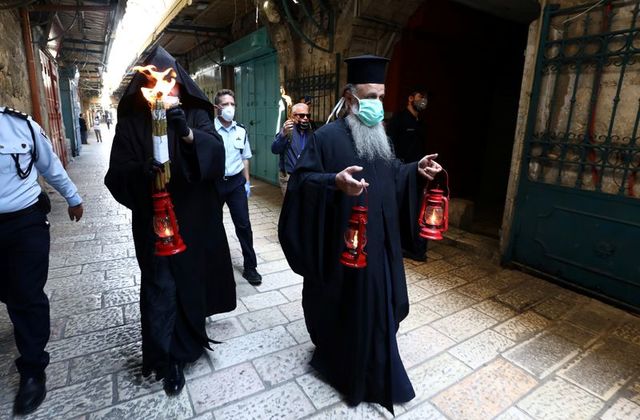
Whether one believes in masks or not, wearing one would seem an obvious part of our Christian “love your neighbor” policy. Someone said to me, “When I get to church I just feel safe.” Well… great, but what about the people around you? Do they feel safe? “Love your neighbor.”
I very much dislike wearing a mask. It’s a pain in the nose, and my glasses fog up when I’m chanting. But that’s hardly the end of the world. And surely at this point in history it’s better than blowing droplets from my throat on the people around me, and distracting them from worship. The corollary: When I go to church and find people not wearing masks so that I feel unsafe, I have a simple solution. I go home. I’m not going to play games with this.
Live Stream Worshiping
For some time I have been worshiping on Sundays by Live Stream. If Sunday attendance is limited in your church or if you don’t feel safe there, please do the same. Do not skip church. Live Stream.
Here’s how to do it. Dress appropriately. Men: no pjs or shorts and t-shirts. Women: you decide. (What do I know?) Turn off your phone and put it where you can’t reach it, so you won’t be tempted. Light up some incense. Do not drop burning charcoal on the rug. (For some reason, my wife didn’t divorce me.) Sit, stand, levitate – whatever works best for you. Tune in Divine Liturgy. Don’t talk any more than you usually would during worship. And then Concentrate. Listen. Pray. Worship. It can be done. I know it can. Even though it’s nowhere near as good as really being there.
Another possibility: Go to Saturday evening Vespers at your church, a lovely service which carries the Sunday theme – usually sparsely attended, so you can keep distance. If your church has regular weekday services, perhaps you can attend then. I’ve found these to be good alternatives.
What about receiving the Holy Eucharist?
The generally accepted teaching among Orthodox hierarchs and clergy today is that because the Holy Eucharist is the Body and Blood of Christ, “the medicine of immortality”, disease cannot be passed on when we receive it.
This is not official “teaching of the Church”. No Church council has spoken to it. So far as I know, direct references to it in the past are not numerous. * It is a “blessed opinion” held by many. However, this belief sends most Orthodox medics whom I know right up the wall. My point: if you doubt this you are not a heretic, so relax.
- If I’m wrong about this, please correct me. Of course till the late 19th century we didn’t know about germs and viruses.
My personal experience suggests it is true, since during my decades of receiving the chalice after everyone else every Sunday, I was never sicker than anyone else – although that was not during time of pandemic. On the other hand, I know a priest whose reserved Holy Gifts went moldy so, believing that the Bread could never make a person sick, he ate it and had to be taken to the doctor quickly.
For now, let’s put the question of the Holy Eucharist itself aside. Let’s look at two self-evident problems: the Communion spoon * and the priest.
- Until about the 10th century, Orthodox laity received the Holy Gifts as the clergy still do: the Body of Christ first, then the Blood of Christ from the chalice. Why the shared spoon came into use is not entirely clear.
The spoon is not blessed, not consecrated. On what theological grounds should we believe that disease cannot be passed on by the spoon?
As for the priest: When administering Communion, it is not possible for him to keep a safe distance. Why should we believe that God will protect us from his breath?
Does asking these questions show lack of faith? No. God gave us brains to use.
I note by Live Streaming that, at least in some places, bishops and priests are aware of these concerns and are taking sensible precautions to deal with them. 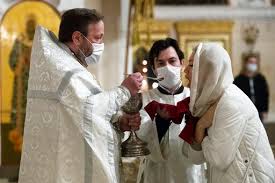 Some bishops direct their priests to wear masks as they give out the Eucharist. Right: Christ the Savior Cathedral, Moscow, Russia If the spoon has any contact with the lips or tongue, it is then dipped in very high proof alcohol – somewhat like at a doctor’s office. I note that some churches ar using multiple spoons. Whether they’re doing it right or wrong, God bless them for their pastoral sensitivity.
Some bishops direct their priests to wear masks as they give out the Eucharist. Right: Christ the Savior Cathedral, Moscow, Russia If the spoon has any contact with the lips or tongue, it is then dipped in very high proof alcohol – somewhat like at a doctor’s office. I note that some churches ar using multiple spoons. Whether they’re doing it right or wrong, God bless them for their pastoral sensitivity.
Years back, when it looked as if there might be an AIDS pandemic, our late Antiochian Metropolitan Philip was exploring how to administer Communion in a similar way.
What to do if you are not receiving the Eucharist
I speak from experience here. Given the circumstances, I have not received Holy Communion since February.
Let me tell you: It is a sad thing to be deprived of the Eucharist. However, does this separate us from Jesus Christ? No, it does not. I’ve discovered this for myself.
This is not to denigrate the Holy Eucharist, certainly not! But as Father Alexander Schmemann once said: If we believe Christ’s Real Presence consists of only five minutes during Divine Liturgy, then what’s the rest of the Liturgy? Christ’s Real Absence? Of course not.
Nor does the rest of our life consist of Christ’s Real Absence. We are Baptized and are part of His Church, the Body of Christ, so He is present always with us. He lives in us and we in Him. He is with you when you Live Stream Liturgy. He is with you when you pray and read the Scriptures. He is with you when you call or text or e-mail another member of the Church. He is with you when you give aid to “the least of these my brethren”. He is with you always, There is nowhere Christ our God is not – waiting everywhere for you, if only you seek Him. Our God is not limited to Bread and Wine. The Holy Eucharist is not intended to be an end in itself, but rather our Gateway into His Presence everywhere.
If you are not receiving the Eucharist right now, here’s what to do: Keep the pre-Communion Fast as you usually do. Participate in the Divine Liturgy, whether at church or somewhere Live Stream. At the time for Communions, pray something like this: “Lord Jesus Christ, please come to me. Be present in me, and give me Your strength.” Simple as that. Open your heart to Him, and He will enter it.
But what a blessing it will be when we can all receive the Holy Eucharist together in church again.
Next Week: Some wonderfully good advice from Fr Tom Hopko
Week after next: The Fourth Ecumenical Council – “What we have here is a failure to communicate.”
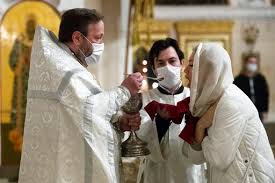
Thank you Fr. Bill. Good advice. Our small parish is following what you wrote. About a month ago, we reopened cautiously. We attend Sunday services by invitation, so that we do not go over the 25 limit. Our leaders distanced the rows of chairs, we have assigned seating, and we wear masks. So far, none of us have become sick.
God bless you.
I wonder if you may like the excellent site called MedCram where a doctor with teacher training lectures on this pandemic. He is a working pulmonologist and gives his lessons after working with virus patients in the hospital. All his information is from peer reviewed medical literature . Try his lectures on Youtube. Dr Seheult. He has made them all free as a public service. Lately in lecture 91 or 92
he refers us to a tool used to evaluate medical information called DISCERN, produced by Oxford University in the 1990s think.
Thank you. I checked out the site. There’s a lot of good information there, some of it above my capability as a “medical layman” to grasp, but all presented well. I think some of you would find it useful.
Thank you, wise thoughtful words, and so timely.
Thank you for this encouraging perspective and practical tips on worshiping at home. As someone fairly new to Orthodoxy, it means a lot to hear from a priest is in the same situation. I have wondered how many of us there are who yearn to go to church but can’t for the time being. My husband and I are so grateful for the streaming services and for your blog.
You’re welcome. As my mother used to say, “This too will pass.”